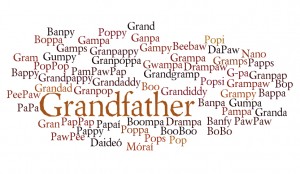From Matthew’s Gospel:
As he walked by the Sea of Galilee, he saw two brothers, Simon, who is called Peter, and Andrew his brother, casting a net into the lake — for they were fishermen.
(From the Daily Office Lectionary – Matthew 4:18 (NRSV) –May 10, 2014)
 Sometime this fall, probably during October, my wife and I will become grandparents for the first time. Last night, a friend asked, “What will you be called?” Because the question came out of the blue (we hadn’t been discussing children or grandchildren), I didn’t know what he was asking — and my face must have shown it. “As grandfather,” he clarified, “what will you be called as a grandparent?”
Sometime this fall, probably during October, my wife and I will become grandparents for the first time. Last night, a friend asked, “What will you be called?” Because the question came out of the blue (we hadn’t been discussing children or grandchildren), I didn’t know what he was asking — and my face must have shown it. “As grandfather,” he clarified, “what will you be called as a grandparent?”
Good question. Is it really up to me? Do I get to say, “I want to be called [something]”? If so, I’d like to be called by one of the Irish nicknames: “Daideó” (pronounced “DAH-doe”) or “Móraí” (pronounced “MO-ree”) or “Papaí” (pronounced “PAH-pee”). The actual word for “grandfather” in Irish is seanathair which means “old father” or (in older Irish) “wise father”; an alternative is athair mór which means “great father” (“great” here is more akin to “big” than to “wonderful”).
But is it really up to me? Families have long-running traditions about naming grandparents, I think. Every grandmother (for the three generations I have known) on both sides of my family was known as “Grammy” — my mother called hers “Grammy Buss” and “Grammy Sargent”; mine were “Grammy Grace” and “Grammy Edna” (we were a less formal generation, I guess), and my mother was “Grammy Betty” to our children.
Grandfathers were less uniformly addressed. I don’t know what my greatgrandfathers were called; both were long dead when I was born. My maternal grandfather, Richard Sargent, was “Daddy Rich” (a combination of what my mother and grandmother called him); my paternal grandfather was “C.E.” (what everyone called him) or, less frequently, “Granddad.” My father was deceased when his grandchildren were born, so if he was referred to at all it was as “your grandfather, York”; my stepfather, Stan Shivers, was called “GrandStan” by my niece and nephew and my children.
One thing I’ve noticed is that the first-born grandchildren get to make the decision. My brother was nearly ten years older than me, and I had two older paternal cousins, so by the time I came along grandparental names were pretty much cast in stone. We have nieces and nephews several years older than our own children, so they had settled the issue on both sides long before our kids had a say.
All of this comes to mind this morning because of “Simon, who is called Peter.” It was Jesus who gave him that name: “I tell you, you are Peter, and on this rock I will build my church.” (Mt 16:18) For many years, I wondered why Jesus gave Simon this nickname and thought it was simply out of affection — it’s nearly the equivalent of “Rocky” and since Simon Peter often seems as dense as a bag of rocks, that made sense.
But I’ve come recently (while studying the prophets with an Education for Ministry group) to believe that Jesus is following in the tradition of Isaiah and, since he has no son to name, he is giving Simon a symbolic prophetic nickname in the same way that prophet named his children. Isaiah named his sons Shear-jashub, which means “the remnanet shall return,” and Maher-shalal-hash-baz, which means “he has hurried to plunder,” as signs against Judah and Jerusalem. I think Jesus gave Simon the new name Peter in a similar way, as a prophetic sign to the church.
Shear-jashub, Maher-shalal-has-baz, and Simon Peter had no say in the matter. So I still wonder with respect to this question of grandparental naming, is it really up to me?
And I wonder if grandparental naming is a prophetic activity. Does the name chosen shape the relationship? Does it portend what the relationship will be? Certainly, one would suspect that if a child is taught to call its grandfather “Grandfather,” that relationship will be rather different than that of a child who calls his or her grandfather “Grampa.” But do “Granddad” or “Papaí” or “Nano” shape the bond differently? And, if so, how?
This matter of choosing a grandparental nickname is serious stuff . . . assuming it really is up to me.
====================
A request to my readers: I’m trying to build the readership of this blog and I’d very much appreciate your help in doing so. If you find something here that is of value, please share it with others. If you are on Facebook, “like” the posts on your page so others can see them. If you are following me on Twitter, please “retweet” the notices of these meditations. If you have a blog of your own, please include mine in your links (a favor I will gladly reciprocate). Many thanks!
====================
Father Funston is the rector of St. Paul’s Episcopal Church, Medina, Ohio.



Lots to ponder in this post – thank you!
And you are right – grandchild number one will decide for you. I wouldn’t ever have predicted that my father would be known as “Granda Honey”. We started using “Grandad,” my daughter heard my mom call him “honey,” and voila, a Granda Honey was born. 22 years later, both my girls still call him that.